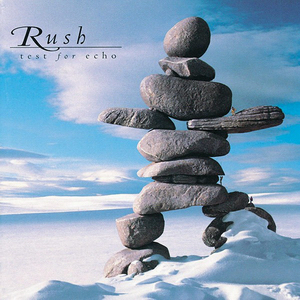Test For Echo (1996)
In retrospect,
Test For Echo is probably best remembered for being the last album Rush made before tragic events in Neil Peart's life caused the band to take an indefinite hiatus. That said, it doesn't sound like a final album, obviously since it was planned on being one. In fact it sounds the opposite, being a logical step from
Counterparts and continuing the evolution that started with
Presto 7 years earlier.
Test For Echo has a more raw and aggressive sound than previous albums, almost sounding more jam based. It also sees the band's more proggy elements starting to creep back, found in quite a few songs, including Time and Motion and Limbo. Many of the songs feature more extended arrangements and free feeling guitar solos reminiscent of the 70's Rush. Though this album, like
Counterparts, also features some nods to their 90's contemporaries, such as in Half The World. This could also be the most raw sounding album yet; the keyboards are almost completely nonexistent.
This album also shows the band once again experimenting and developing their craft. For example, on Half The World we hear Alex Lifeson rock the mandola for the first time. He would continue to experiment with other stringed instruments later on, such as the bouzouki and mandolin. Almost 25 years and 16 albums later, we still see members of the band revealing previously unknown talents.
Throughout the 90's, Neil Peart had played on several Buddy Rich tribute projects. The new experiences combined with being introduced to other drummers, notably Journey's Steve Smith, inspired Peart to reinvent his style. In preparation for the next Rush album, he began studying with Jazz veteran Freddie Gruber. The result was a more loose drumming style and Neil now playing with a traditional grip. He also began incorporating Jazz fills into his live drum solos.
(1927-2011)
With 3 years since their last album and much growth in all 3 musicians, the result was a fresh sound for the band. Because of this,
Test For Echo is more in line with
Vapor Trails and
Snakes & Arrows than
Counterparts. It's hard to believe that this was the same band who had previously written songs like Time Stand Still and Presto. This was a more in your face band, with a riff based approach and songs that didn't lose energy, even when they weren't rocking.
Lyrics for this album are varied, with no obvious recurring theme or concept. Neil Peart once again collaborated with Pye Dubois on the title track. As of 2013, this is the last time the two collaborated on a track. Virtuality is about how the internet affects relationships, a theme that is more common today but certainly new when this album was written.
Test For Echo could be the most forgotten Rush album. Perhaps it's because of its time period, or it was overshadowed by the band's hiatus. Though it does feature the song that gave way for one of the band's most interesting arrangements. Upon returning to the stage in 2002, Geddy and Alex put together an acoustic duet version of the song Resist. Aside from that, not a lot of material from this album gets played live.
This was yet another Billboard Top 5 album for the band, though it only reached gold status. As other styles of music began to take dominance, Rush was still hanging on,despite not creating the same monster hits they had in the 80's.
Unfortunately, the celebration that comes with a new album and tour was cut short when Neil Peart's daughter was killed in a car accident. 10 months later, his wife also passed, succumbing to cancer. At this point, the band was completely put on hold with an uncertain future and very little possibility of continuing. A distressed Peart began a long series of travels across North and South America by motorcycle. He chronicled his journey in a book titled
Ghost Rider: Travels On The Healing Road, released in 2002.
As an aside, this album turned 17 years old on Tuesday. It's exactly 20 days older than me.







